海伦斯诺翻译译文 英译汉
海伦斯诺
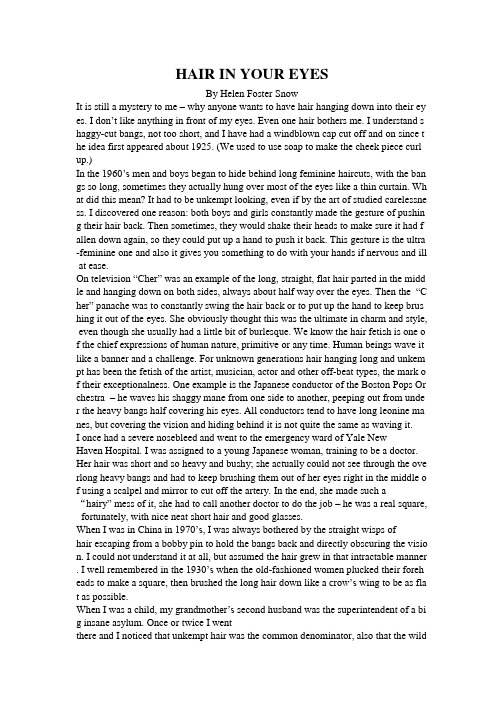
HAIR IN YOUR EYESBy Helen Foster SnowIt is still a mystery to me – why anyone wants to have hair hanging down into their ey es. I don’t like anything in front of my eyes. Even one hair bothers me. I understand s haggy-cut bangs, not too short, and I have had a windblown cap cut off and on since t he idea first appeared about 1925. (We used to use soap to make the cheek piece curl up.)In the 1960’s men and boys began to hide behind long feminine haircuts, with the ban gs so long, sometimes they actually hung over most of the eyes like a thin curtain. Wh at did this mean? It had to be unkempt looking, even if by the art of studied carelessne ss. I discovered one reason: both boys and girls constantly made the gesture of pushin g their hair back. Then sometimes, they would shake their heads to make sure it had f allen down again, so they could put up a hand to push it back. This gesture is the ultra -feminine one and also it gives you something to do with your hands if nervous and ill at ease.On television “Cher” was an example of the long, straight, flat hair parted in the midd le and hanging down on both sides, always about half way over the eyes. Then the “C her” panache was to constantly swing the hair back or to put up the hand to keep brus hing it out of the eyes. She obviously thought this was the ultimate in charm and style, even though she usually had a little bit of burlesque. We know the hair fetish is one o f the chief expressions of human nature, primitive or any time. Human beings wave it like a banner and a challenge. For unknown generations hair hanging long and unkem pt has been the fetish of the artist, musician, actor and other off-beat types, the mark o f their exceptionalness. One example is the Japanese conductor of the Boston Pops Or chestra – he waves his shaggy mane from one side to another, peeping out from unde r the heavy bangs half covering his eyes. All conductors tend to have long leonine ma nes, but covering thevision and hiding behind it is not quite the same as waving it.I once had a severe nosebleed and went to the emergency ward of Yale New Haven Hospital. I was assigned to a young Japanese woman, training to be a doctor. Her hair was short and so heavy and bushy; she actually could not see through the ove rlong heavy bangs and had to keep brushing them out of her eyes right in the middle o f using a scalpel and mirror to cut off the artery. In the end, she made such a “hairy” mess of it, she had to call another doctor to do the job – he was a real square, fortunately, with nice neat short hair and good glasses.When I was in China in 1970’s, I was always bothered by the straight wisps ofhair esc aping from a bobby pin to hold the bangs back and directly obscuring the vision. I cou ld not understand it at all, but assumed the hair grew in that intractable manner. I well remembered in the 1930’s when the old-fashioned women plucked their foreheads to make a square, then brushed the long hair down like a crow’s wing to be as flat as pos sible.When I was a child, my grandmother’s second husband was the superintendent of a bi g insane asylum. Once or twice I wentthere and I noticed that unkempt hair was the co mmon denominator, also that the wildest inmates hid behind heavy locks in front andpeered out with paranoid fear and hostility. In fact, I am writing this today because last night I watched “Nicholas Nickleby” on television. The retarded boy, Smoke, had b een hiding behind long unkempt hair over his eyes – a miracle occurred when it was cut short all over.In the 1960’s one of my aged friends went to visit a family of relatives around Halloween. Their girls appeared in long calico skirts with the long straight hair hangin g like witches and covering half their eyes. At first she thought it was a costume partyfor the holiday – but of course, that was the ne plus ultra of young fashion then all the time.A few minutes ago I watched a woman author on the Donahue show. Her long bangs were curved, but resting actually on the eyelids. She thought herself most attractive, but this hair problem gave me the “creeps”.(Madison, 14 January 1983)英译中及眼碎发有一件事一直令我费解-为什么大家都喜欢那种及眼碎发。
海伦斯诺翻译奖

海伦斯诺翻译奖关于举办第三届全国⼤学⽣“海伦?斯诺翻译奖”竞赛的通知海伦·斯诺(Helen Foster Snow)是美国著名作家、记者、社会活动家、中国⼈民的⽼朋友。
她为中国⾰命和建设事业、为促进中美两国和两国⼈民之间的相互了解和友谊,倾注了毕⽣的⼼⾎。
为了弘扬海伦·斯诺的“架桥”精神,培养⼤学⽣对翻译的兴趣,发现译界新⼈,陕西省翻译协会在斯诺第⼆故乡陕西设⽴“海伦·斯诺翻译奖”,并已成功地举办了两届。
第三届全国⼤学⽣“海伦·斯诺翻译奖”竞赛定于2010年举⾏,由陕西省翻译协会主办、北京⼤学中国埃德加?斯诺研究中⼼、《外语教学》编辑部和陕西斯诺研究中⼼协办。
现就竞赛办法和参赛规则通知如下:⼀、“海伦·斯诺翻译奖”设‘英译汉’和‘汉译英’两个奖项。
英语参赛原⽂选⾃海伦·斯诺的原著;汉语参赛原⽂选⾃国内著名翻译家的汉语译⽂或国内、外学者撰写的有关海伦·斯诺的⽂章。
本届⼤赛的参赛规则刊登在《外语教学》杂志2010年第3 期,参赛原⽂请登录陕西省翻译协会⽹站下载: hppt///doc/bb50461db7360b4c2e3f64ad.html ,或/doc/bb50461db7360b4c2e3f64ad.html / (⼆级⽹站)http:/ 222.90.76.146/xuebao/(学报编辑部)。
⼆、参赛对象为全国各类⾼等院校的在读⽣,包括本科⽣、专科⽣和硕⼠研究⽣。
选⼿参赛时必须在参赛⼈员信息表上提供其注册学号。
“海伦·斯诺翻译奖”竞赛,从不收取任何参赛费⽤。
三、每个奖项设⼀、⼆、三等奖和优秀奖,授予获奖证书和奖品;获奖证书可作为考研、就业、出国进修、评审职称时的有效证据。
竞赛结果将在陕西省翻译协会⽹站公布,同时将刊出参考译⽂。
四、为弘扬海伦·斯诺“诚实、守信、实事求是”的品德,保证竞赛的严肃性和真实性,⼤赛坚决反对任何弄虚作假的⾏为。
To_Helen_中文翻译_评析
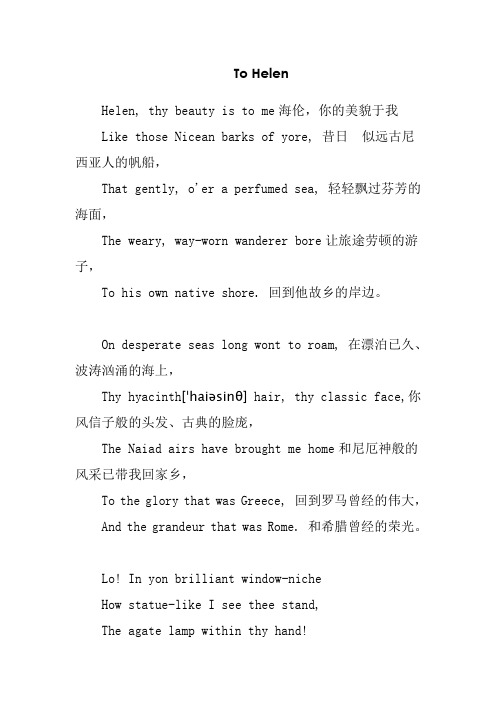
To HelenHelen, thy beauty is to me海伦,你的美貌于我Like those Nicean barks of yore, 昔日 似远古尼西亚人的帆船,That gently, o'er a perfumed sea, 轻轻飘过芬芳的海面,The weary, way-worn wanderer bore让旅途劳顿的游子,To his own native shore. 回到他故乡的岸边。
On desperate seas long wont to roam, 在漂泊已久、波涛汹涌的海上,Thy hyacinth[ˈhaiəsinθ] hair, thy classic face,你风信子般的头发、古典的脸庞,The Naiad airs have brought me home和尼厄神般的风采已带我回家乡,To the glory that was Greece, 回到罗马曾经的伟大, And the grandeur that was Rome. 和希腊曾经的荣光。
Lo! In yon brilliant window-nicheHow statue-like I see thee stand,The agate lamp within thy hand!Ah, Psyche, from the regions whichAre Holy-Land!瞧!彼处辉煌窗龛里你,恰似雕像,伫立,玛瑙灯儿手中提!啊,普赛克,来自仙土圣地!注:1. those Nicean barks of yore: 古代尼西亚人的那些航船,意指具有古典的美。
2. hyacinth: 风信子花。
根据古希腊神话,太阳神阿波罗所钟爱的少年海尔欣瑟斯(Hyacinthus)有一头美丽的长发,在他被误杀后,从他的血泊中长出了一种纤细修长,迎风招展的美丽鲜花。
3. airs: 音乐旋律和曲调。
Unit1 译文

Unit1 The Splendor of the Lake District坐落于英格兰西北部一角的湖区是无可比拟的。
在这个仅有30里的郁郁葱葱的角落里,英格兰最高耸险峻的山与最广阔幽深的湖紧紧依偎在一起,构成了最壮观美丽的风景。
令人叹为观止的山峰和绵延起伏的丘陵俯瞰着绿意盎然的山谷。
羊群在山谷间布满青苔的石墙边安静地吃草。
现在这个风景秀丽的乡村一角已经成为国家湖区公园, 具有典型的英式风格。
这里的风景布局完美紧凑,所以当人们大步流星地走在布满青草的山坡上时,可以观赏到脚下群山倒映于水中的壮丽平和的景象。
这里的风景布局巧妙紧凑,当你漫步于长满青草的山坡,便可欣赏到壮丽秀美的景象。
脚下远处的湖泊在宏伟山峰的衬托下, 展现出了田园般的静谧和平和。
湖区有着很长的一段历史,由火山、地震和冰河世纪形成的独特景象留下了险峻的火山岩山峰、美丽的褶皱景象以及奇妙的冰蚀河谷。
高耸于凯斯维克之上的克斯尔里格怪石圈能够唤起人们对早期定居者以及它们被巍峨群山包围着的聚居地的回忆。
来自斯堪的纳维亚的定居者也在这片风景区留下了他们的痕迹. 在这里, 游客们随处可见发出清脆声响的小溪和奔涌而下的瀑布. 于是他们创造出了独特的湖区词汇, 比如“tarn”指小山地湖, “force”指瀑布, “fell”指小山, “gill”指山涧, “beck”指小溪. 此外, 当中世纪的修道院开始通过羊毛贸易赚钱时, 他们也留下了在湖区草场那田园般安静平和的角落里放羊的习俗.湖区风景有着独特的魅力,难怪这个国家一些最一流的作家都选择在那里居住并对其情有独钟。
诗人威廉•华兹华斯与她的妹妹多萝西、妻子玛丽和最大的三个孩子曾经生活在格拉斯米尔的鸽舍。
当布谷鸟的钟声敲出和谐的乐音时,来访者轻叩了前门,然后坐在窗边一个深凹下去的座椅上,或者坐在壁炉旁,细细读起了多萝西那周的日记。
1802年一个宜人的春天,多萝茜散步回来写下一篇日记, 描写了厄尔斯沃特湖边随风摇曳的水仙花。
海伦斯诺的(汉译英).docx
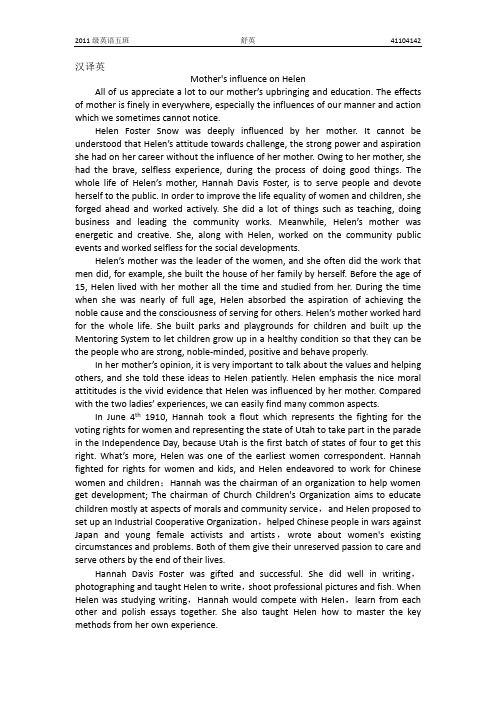
汉译英Mother's influence on HelenAll of us appreciate a lot to our mother’s upbringing and education. The effects of mother is finely in everywhere, especially the influences of our manner and action which we sometimes cannot notice.Helen Foster Snow was deeply influenced by her mother. It cannot be understood that Helen’s attitude towards challenge, the strong power and aspiration she had on her career without the influence of her mother. Owing to her mother, she had the brave, selfless experience, during the process of doing good things. The whole life of Helen’s mother, Hannah Davis Foster, is to serve people and devote herself to the public. In order to improve the life equality of women and children, she forged ahead and worked actively. She did a lot of things such as teaching, doing business and leading the community works. Meanwhile, Helen’s mother was energetic and creative. She, along with Helen, worked on the community public events and worked selfless for the social developments.Helen’s mother was the leader of the women, and she often did the work that men did, for example, she built the house of her family by herself. Before the age of 15, Helen lived with her mother all the time and studied from her. During the time when she was nearly of full age, Helen absorbed the aspiration of achieving the noble cause and the consciousness of serving for others. Helen’s mother worked hard for the whole life. She built parks and playgrounds for children and built up the Mentoring System to let children grow up in a healthy condition so that they can be the people who are strong, noble-minded, positive and behave properly.In her mother’s opinion, it is very important to talk about the values and helping others, and she told these ideas to Helen patiently. Helen emphasis the nice moral attititudes is the vivid evidence that Helen was influenced by her mother. Compared with the two ladies’ experiences, we can easily find many common aspects.In June 4th1910, Hannah took a flout which represents the fighting for the voting rights for women and representing the state of Utah to take part in the parade in the Independence Day, because Utah is the first batch of states of four to get this right. What’s more, Helen was one of the earliest women correspondent. Hannah fighted for rights for women and kids, and Helen endeavored to work for Chinese women and children;Hannah was the chairman of an organization to help women get development; The chairman of Church Children's Organization aims to educate children mostly at aspects of morals and community service,and Helen proposed to set up an Industrial Cooperative Organization,helped Chinese people in wars against Japan and young female activists and artists,wrote about women's existing circumstances and problems. Both of them give their unreserved passion to care and serve others by the end of their lives.Hannah Davis Foster was gifted and successful. She did well in writing,photographing and taught Helen to write,shoot professional pictures and fish. When Helen was studying writing,Hannah would compete with Helen,learn from each other and polish essays together. She also taught Helen how to master the key methods from her own experience.As they lived in a traditional and conventional society,Hannah could not get plenty opportunities to show her wits and talents. Helen thought herself as a modern woman,which may be the reason she never talked about Hannah in public. However,she praised her mom quite appropriately before death. It was probably her crying for Hannah's resurrection;it was probably a pigeon that sent her miss to Hannah. The nurse who looked after Helen,Nancy Farnan,reported that in the last two weeks of Helen,she often called for her mom,talked to her mom,just as her mom in the room.It was her mother's influence on her that makes her right attitude and good manners in her early life, which is also the foundation of her later great achievement in China.。
Helen of Troy
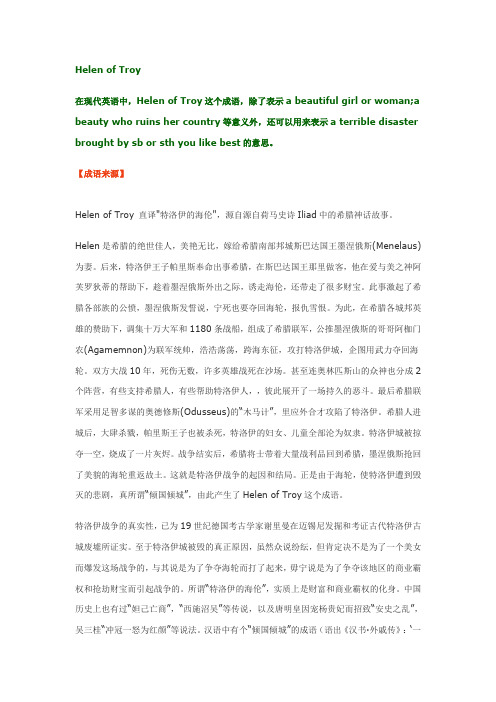
Helen of Troy在现代英语中,Helen of Troy这个成语,除了表示a beautiful girl or woman;a beauty who ruins her country等意义外,还可以用来表示a terrible disaster brought by sb or sth you like best的意思。
【成语来源】Helen of Troy 直译"特洛伊的海伦",源自源自荷马史诗Iliad中的希腊神话故事。
Helen是希腊的绝世佳人,美艳无比,嫁给希腊南部邦城斯巴达国王墨涅俄斯(Menelaus)为妻。
后来,特洛伊王子帕里斯奉命出事希腊,在斯巴达国王那里做客,他在爱与美之神阿芙罗狄蒂的帮助下,趁着墨涅俄斯外出之际,诱走海伦,还带走了很多财宝。
此事激起了希腊各部族的公愤,墨涅俄斯发誓说,宁死也要夺回海轮,报仇雪恨。
为此,在希腊各城邦英雄的赞助下,调集十万大军和1180条战船,组成了希腊联军,公推墨涅俄斯的哥哥阿枷门农(Agamemnon)为联军统帅,浩浩荡荡,跨海东征,攻打特洛伊城,企图用武力夺回海轮。
双方大战10年,死伤无数,许多英雄战死在沙场。
甚至连奥林匹斯山的众神也分成2个阵营,有些支持希腊人,有些帮助特洛伊人,,彼此展开了一场持久的恶斗。
最后希腊联军采用足智多谋的奥德修斯(Odusseus)的“木马计”,里应外合才攻陷了特洛伊。
希腊人进城后,大肆杀戮,帕里斯王子也被杀死,特洛伊的妇女、儿童全部沦为奴隶。
特洛伊城被掠夺一空,烧成了一片灰烬。
战争结实后,希腊将士带着大量战利品回到希腊,墨涅俄斯抢回了美貌的海轮重返故土。
这就是特洛伊战争的起因和结局。
正是由于海轮,使特洛伊遭到毁灭的悲剧,真所谓“倾国倾城”,由此产生了Helen of Troy这个成语。
特洛伊战争的真实性,已为19世纪德国考古学家谢里曼在迈锡尼发掘和考证古代特洛伊古城废墟所证实。
最新To Helen 中文翻译 评析
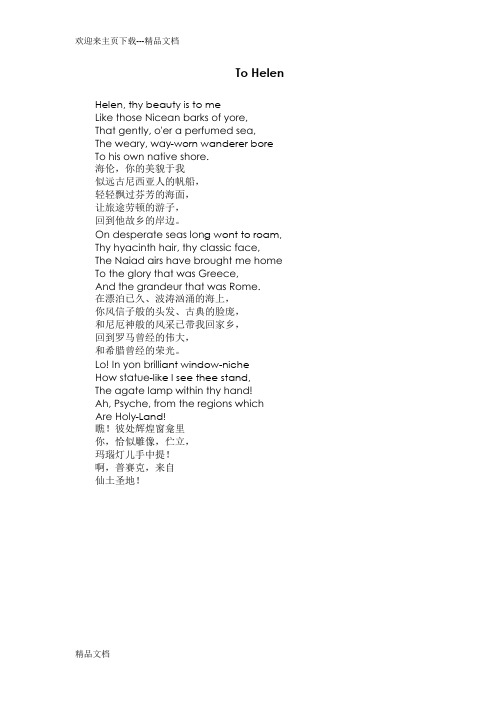
To Helen Helen, thy beauty is to me-worn wanderer bore海伦,你的美貌于我似远古尼西亚人的帆船,轻轻飘过芬芳的海面,让旅途劳顿的游子,回到他故乡的岸边。
g wont to roam,在漂泊已久、波涛汹涌的海上,你风信子般的头发、古典的脸庞,和尼厄神般的风采已带我回家乡,回到罗马曾经的伟大,和希腊曾经的荣光。
ant window-niche-like I see thee stand,-Land!瞧!彼处辉煌窗龛里你,恰似雕像,伫立,玛瑙灯儿手中提!啊,普赛克,来自仙土圣地!注:1. those Nicean barks of yore: 古代尼西亚人的那些航船,意指具有古典的美。
2. hyacinth: 风信子花。
根据古希腊神话,太阳神阿波罗所钟爱的少年海尔欣瑟斯(Hyacinthus)有一头美丽的长发,在他被误杀后,从他的血泊中长出了一种纤细修长,迎风招展的美丽鲜花。
3. airs: 音乐旋律和曲调。
4. agate: 玛瑙。
5. Psyche: 普塞克,古希腊、罗马神话中嫁给爱神厄洛斯的美女。
厄洛斯禁止她看见自己的形象,但是普塞克还是克制不住好奇心,在夜晚举灯看见了丈夫的模样,结果被逐出家门。
6. Naiad: 古希腊、罗马神话中的水泉女神。
"To Helen" is the first of two poems to carry that name written by Edgar Allan Poe. The 15-line poem was written in honor of Jane Stanard, the mother of a childhood friend. It was first published in 1831 collection Poems of Edgar A. Poe then reprinted in 1836 in the Southern Literary Messenger. Poe revised the poem in 1845, making several improvements, most notably changing "the beauty of fair Greece, and the grandeur of old Rome" to "the glory that was Greece and the grandeur that was Rome." These improved lines are the most well-known lines of the poem.BackgroundEdgar Allan Poe wrote “To Helen” as a reflection on the beauty of Mrs. Jane Stith Stanard, who died in 1824. She was the mother of one of Poe’s scho ol classmates, Robert Stanard. When Robert invited Edgar, then 14, to his home in 1823, Poe was greatly taken with the 27-year-old woman, who is said to have urged him to write poetry. He was later to write that she was his first real love.ThemeThe theme of this short poem is the beauty of a woman with whom Poe became acquainted when he was 14. Apparently she treated him kindly and may have urged him–or perhaps inspired him–to write poetry. Beauty, as Poe uses the word in the poem, appears to refer to the woman's soul as well as her body. On the one hand, he represents her as Helen of Troy–the quintessence of physical beauty–at the beginning of the poem. On the other, he represents her as Psyche–the quintessence of soulful beauty–at the end of the poem. In Greek, psyche means soul.Imagery and Summary of the Poem Poe opens the poem with a simile–“Helen, thy beauty is to me / Like those Nicéan barks of yore”–that compares the beauty of Helen with small sailing boats (barks) that carried home travelers in ancient times. He extends this boat imagery into the second stanza, when he says Helen brought him home to the shores of the greatest civilizations of antiquity, classical Greece and Rome. It may well have been that Mrs. Stanard’s beauty and other admirable qualities, as well as her taking notice of Poe’s writing ability, helped inspire him to write poetry that mimicked in some ways the classical tradition of Greece and Rome. Certainly the poem’s allusions to mythology and the classical age suggest that he had a grounding in, and a fondness for, ancient history and literature. In the final stanza of the poem, Poe imagines that Mrs. Stanard (Helen) standing before him in a recess or alcove in front of a window. She is holding an agate lamp, as the beautiful Psyche did when she discovered the identity of Eros (Cupid). For further information on the agate lamp, Psyche, and Eros, sees the comments opposite the third stanza.Analysis:As is typical with many of Poe's poems, the rhythm and rhyme scheme of "To Helen" is irregular but musical in sound. The poem consists of three stanzas of five lines each, where the end rhyme of the first stanza is ABABB, that of the second is ABABA, and that of the third is ABBAB. Poe uses soothing, positive words and rhythms to create a fitting tone and atmosphere for the poem. His concluding image is that of light, with a "brilliant window niche" and the agate lamp suggesting the glowing of the "Holy Land," for which Helen is the beacon.Original 1831 version Helen, thy beauty is to meLike those Nicean barks of yore, That gently, o'er a perfum'd sea,The weary way-worn wanderer bore To his own native shore.On desperate seas long wont to roam, Thy hyacinth hair, thy classic face, Thy Naiad airs have brought me home To the beauty of fair Greece,And the grandeur of old Rome.Lo ! in that little window-nicheHow statue-like I see thee stand!The folded scroll within thy hand —A Psyche from the regions whichAre Holy land !Revised 1845 version Helen, thy beauty is to meLike those Nicean barks of yoreThat gently, o'er a perfumed sea, The weary, way-worn wanderer bore To his own native shore.On desperate seas long wont to roam, Thy hyacinth hair, thy classic face, Thy Naiad airs have brought me home To the glory that was Greece,And the grandeur that was Rome. Lo, in yon brilliant window-niche How statue-like I see thee stand, The agate lamp within thy hand,Ah! Psyche, from the regions which Are Holy Land!。
第五届海伦斯诺翻译奖英译汉译文
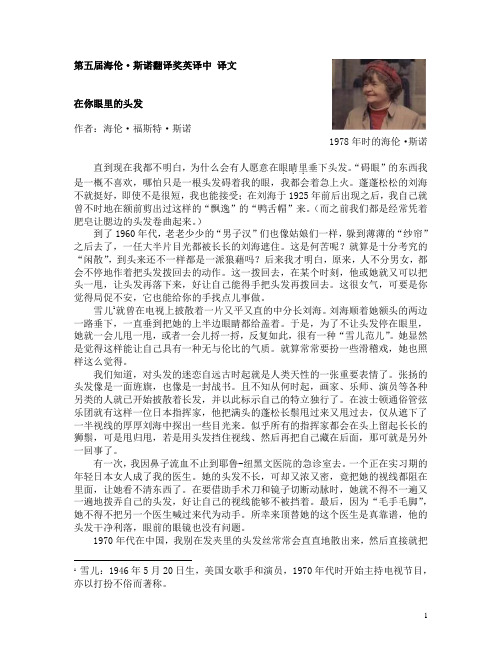
第五届海伦·斯诺翻译奖英译中译文在你眼里的头发作者:海伦·福斯特·斯诺1978年时的海伦·斯诺直到现在我都不明白,为什么会有人愿意在眼睛里...垂下头发。
“碍眼”的东西我是一概不喜欢,哪怕只是一根头发碍着我的眼,我都会着急上火。
蓬蓬松松的刘海不就挺好,即使不是很短,我也能接受;在刘海于1925年前后出现之后,我自己就曾不时地在额前剪出过这样的“飘逸”的“鸭舌帽”来。
(而之前我们都是经常凭着肥皂让腮边的头发卷曲起来。
)到了1960年代,老老少少的“男子汉”们也像姑娘们一样,躲到薄薄的“纱帘”之后去了,一任大半片目光都被长长的刘海遮住。
这是何苦呢?就算是十分考究的“闲散”,到头来还不一样都是一派狼藉吗?后来我才明白,原来,人不分男女,都会不停地作着把头发拨回去的动作。
这一拨回去,在某个时刻,他或她就又可以把头一甩,让头发再落下来,好让自己能得手把头发再拨回去。
这很女气,可要是你觉得局促不安,它也能给你的手找点儿事做。
雪儿1就曾在电视上披散着一片又平又直的中分长刘海。
刘海顺着她额头的两边一路垂下,一直垂到把她的上半边眼睛都给盖着。
于是,为了不让头发停在眼里,她就一会儿甩一甩,或者一会儿捋一捋,反复如此,很有一种“雪儿范儿”。
她显然是觉得这样能让自己具有一种无与伦比的气质。
就算常常要扮一些滑稽戏,她也照样这么觉得。
我们知道,对头发的迷恋自远古时起就是人类天性的一张重要表情了。
张扬的头发像是一面旌旗,也像是一封战书。
且不知从何时起,画家、乐师、演员等各种另类的人就已开始披散着长发,并以此标示自己的特立独行了。
在波士顿通俗管弦乐团就有这样一位日本指挥家,他把满头的蓬松长鬃甩过来又甩过去,仅从遮下了一半视线的厚厚刘海中探出一些目光来。
似乎所有的指挥家都会在头上留起长长的狮鬃,可是甩归甩,若是用头发挡住视线、然后再把自己藏在后面,那可就是另外一回事了。
有一次,我因鼻子流血不止到耶鲁-纽黑文医院的急诊室去。
To Helen 中文翻译 评析

To Helen Helen, thy beauty is to meLike those Nicean barks of yore,That gently, o'er a perfumed sea,The weary, way-worn wanderer bore To his own native shore.海伦,你的美貌于我似远古尼西亚人的帆船,轻轻飘过芬芳的海面,让旅途劳顿的游子,回到他故乡的岸边。
On desperate seas long wont to roam, Thy hyacinth hair, thy classic face,The Naiad airs have brought me home To the glory that was Greece,And the grandeur that was Rome.在漂泊已久、波涛汹涌的海上,你风信子般的头发、古典的脸庞,和尼厄神般的风采已带我回家乡,回到罗马曾经的伟大,和希腊曾经的荣光。
Lo! In yon brilliant window-nicheHow statue-like I see thee stand,The agate lamp within thy hand!Ah, Psyche, from the regions which Are Holy-Land!瞧!彼处辉煌窗龛里你,恰似雕像,伫立,玛瑙灯儿手中提!啊,普赛克,来自仙土圣地!注:1. those Nicean barks of yore: 古代尼西亚人的那些航船,意指具有古典的美。
2. hyacinth: 风信子花。
根据古希腊神话,太阳神阿波罗所钟爱的少年海尔欣瑟斯(Hyacinthus)有一头美丽的长发,在他被误杀后,从他的血泊中长出了一种纤细修长,迎风招展的美丽鲜花。
3. airs: 音乐旋律和曲调。
4. agate: 玛瑙。
5. Psyche: 普塞克,古希腊、罗马神话中嫁给爱神厄洛斯的美女。
海伦斯诺翻译 中译英
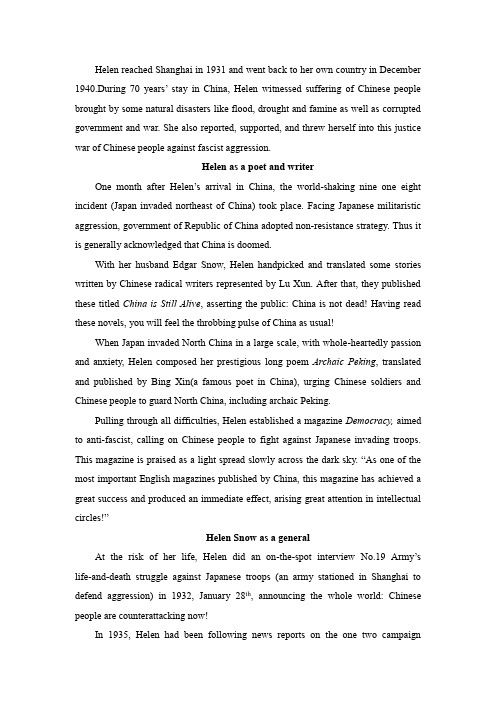
Helen reached Shanghai in 1931 and went back to her own country in December 1940.During 70 years’ stay in China, Helen witnessed suffering of Chinese people brought by some natural disasters like flood, drought and famine as well as corrupted government and war. She also reported, supported, and threw herself into this justice war of Chinese people against fascist aggression.Helen as a poet and writerOne month after Helen’s arrival in China, the world-shaking nine one eight incident (Japan invaded northeast of China) took place. Facing Japanese militaristic aggression, government of Republic of China adopted non-resistance strategy. Thus it is generally acknowledged that China is doomed.With her husband Edgar Snow, Helen handpicked and translated some stories written by Chinese radical writers represented by Lu Xun. After that, they published these titled China is Still Alive, asserting the public: China is not dead! Having read these novels, you will feel the throbbing pulse of China as usual!When Japan invaded North China in a large scale, with whole-heartedly passion and anxiety, Helen composed her prestigious long poem Archaic Peking, translated and published by Bing Xin(a famous poet in China), urging Chinese soldiers and Chinese people to guard North China, including archaic Peking.Pulling through all difficulties, Helen established a magazine Democracy, aimed to anti-fascist, calling on Chinese people to fight against Japanese invading troops. This magazine is praised as a light spread slowly across the dark sky. “As one of the most important English magazines published by China, this magazine has achieved a great success and produced an immediate effect, arising great attention in intellectual circles!”Helen Snow as a generalAt the risk of her life, Helen did an on-the-spot interview No.19 Army’s life-and-death struggle against Japanese troops (an army stationed in Shanghai to defend aggression) in 1932, January 28th, announcing the whole world: Chinese people are counterattacking now!In 1935, Helen had been following news reports on the one two campaign(compatriotic students demonstrated on the road against the Treaty of Paris) for 6 months, coming out first in the millions of journalists from home and abroad.Leaving for Xi’an for interviewing Chinese general Zhang Xueliang(subject to the northeast of China), Helen printed an inclusive report titled Chinese Generals are Close to the Red Army rather than Japanese, United as One in Herald Journal in London on October 3rd, 1936. This report revealed information of the second cooperation between the Communist Party and the KMT and forecasted the Xi’an Incident(2 KMT generals, Zhang Xueliang and Yang Hucheng, imprisoned Chiang kai-shek and demanding ceasing the civil war and uniting with the Communist Party to fight the Japanese invaders )After the Xi’an Incident, Helen reported a series of news to clarify matters and get to the bottom of things, contributing to the peaceful conclusion of this incident and the formation of anti-Japanese national united front.During May 3rd to September 12th in 1937, 4 months’ stay in Yan’an, Helen interviewed Mao Zedong, Zhou Enlai and some other 31 leaders of the Red Army, gaining insight into Chinese Communist Party’s policy and strategy in anti-Japanese aggression. This not only brought her sufficient first-hand information but also forced her to write letters several times to her husband Edgar in Peking to suggest modification and removal of manuscript of Red Star over China which is disadvantageous to Chiang kai-shek in partial chapters and details so as to be beneficial to the anti-Japanese national united front. After publishing this book in the end of that year, this did contribute to the formation and promote of united front.Helen Snow as an anti-fascist warriorHelen is not only a witness but also an active participant in Chinese anti-Japanese aggression war. Their house located in No.13, Kuijiachang Hu tong, Peking is used for secret gathering of student leaders of twelve nine campaign as well as a shelter for them several times to escape from arresting by policemen and armies. Besides, she also gave her advice and suggestions for students’ demonstration. Moreover, she helped students to translate and print the manifesto and slogans addressing in the march. In order to protect students from stemming and beating up bythose policemen, Helen ran in the front of the procession and took photos.Facing the blown down Chinese industry and lack of basic goods for soldiers and people against Japanese aggression, Helen prospectively came up with a proposal of establishing Indusco. Furthermore, she raised funds from bath domestic areas and overseas, promoting Indusco campaign in China vigorously, timely, effectively supporting China’s anti-Japanese aggression.。
ToHelen中文翻译评析
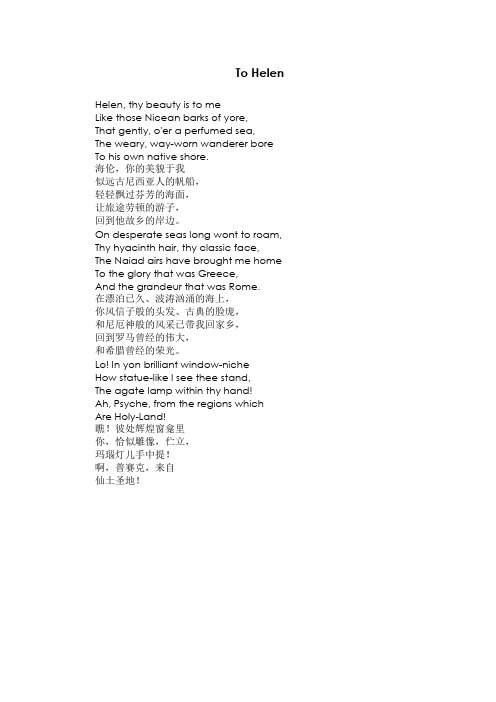
To Helen Helen, thy beauty is to meLike those Nicean barks of yore,That gently, o'er a perfumed sea,The weary, way-worn wanderer bore To his own native shore.海伦,你的美貌于我似远古尼西亚人的帆船,轻轻飘过芬芳的海面,让旅途劳顿的游子,回到他故乡的岸边。
On desperate seas long wont to roam, Thy hyacinth hair, thy classic face,The Naiad airs have brought me home To the glory that was Greece,And the grandeur that was Rome.在漂泊已久、波涛汹涌的海上,你风信子般的头发、古典的脸庞,和尼厄神般的风采已带我回家乡,回到罗马曾经的伟大,和希腊曾经的荣光。
Lo! In yon brilliant window-nicheHow statue-like I see thee stand,The agate lamp within thy hand!Ah, Psyche, from the regions which Are Holy-Land!瞧!彼处辉煌窗龛里你,恰似雕像,伫立,玛瑙灯儿手中提!啊,普赛克,来自仙土圣地!注:1. those Nicean barks of yore: 古代尼西亚人的那些航船,意指具有古典的美。
2. hyacinth: 风信子花。
根据古希腊神话,太阳神阿波罗所钟爱的少年海尔欣瑟斯(Hyacinthus)有一头美丽的长发,在他被误杀后,从他的血泊中长出了一种纤细修长,迎风招展的美丽鲜花。
3. airs: 音乐旋律和曲调。
4. agate: 玛瑙。
5. Psyche: 普塞克,古希腊、罗马神话中嫁给爱神厄洛斯的美女。
海伦斯诺参考译文之我见
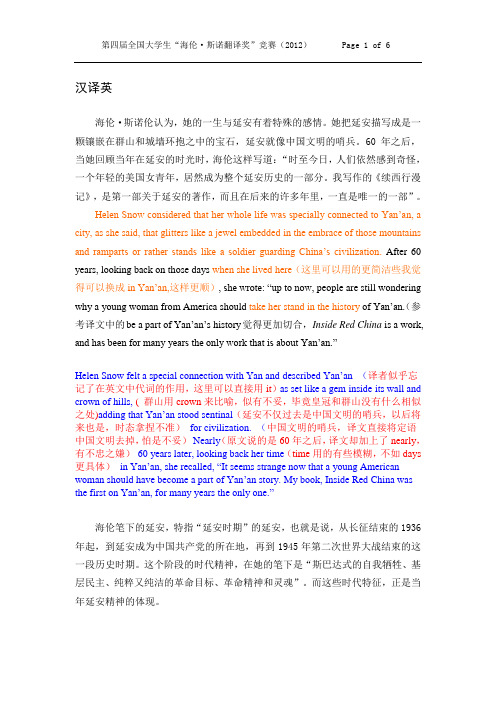
汉译英海伦·斯诺伦认为,她的一生与延安有着特殊的感情。
她把延安描写成是一颗镶嵌在群山和城墙环抱之中的宝石,延安就像中国文明的哨兵。
60年之后,当她回顾当年在延安的时光时,海伦这样写道:“时至今日,人们依然感到奇怪,一个年轻的美国女青年,居然成为整个延安历史的一部分。
我写作的《续西行漫记》,是第一部关于延安的著作,而且在后来的许多年里,一直是唯一的一部”。
Helen Snow considered that her whole life was specially connected to Yan’a n, a city, as she said, that glitters like a jewel embedded in the embrace of those mountains and ramparts or rather stands like a soldier guarding China’s civilization.After 60 years, looking back on those days when she lived here(这里可以用的更简洁些我觉得可以换成in Yan’an,这样更顺), she wrote: “up to now, people are still wondering why a young woman from America should take her stand in the history of Yan’an.(参考译文中的be a part of Yan’an’s history觉得更加切合,Inside Red China is a work, and has been for many years the only work that is about Yan’an.”Helen Snow felt a special connection with Yan and described Yan’an (译者似乎忘记了在英文中代词的作用,这里可以直接用it)as set like a gem inside its wall and crown of hills, ( 群山用crown来比喻,似有不妥,毕竟皇冠和群山没有什么相似之处)adding that Yan’an stood sentinal(延安不仅过去是中国文明的哨兵,以后将来也是,时态拿捏不准)for civilization. (中国文明的哨兵,译文直接将定语中国文明去掉,怕是不妥)Nearly(原文说的是60年之后,译文却加上了nearly,有不忠之嫌)60 years later, looking back her time(time用的有些模糊,不如days 更具体)in Yan’an, she recalled, “It seems strange now that a young American woman should have become a part of Yan’an story. My book, Inside Red China was the first on Yan’an, for many years the only one.”海伦笔下的延安,特指“延安时期”的延安,也就是说,从长征结束的1936年起,到延安成为中国共产党的所在地,再到1945年第二次世界大战结束的这一段历史时期。
E-C海伦斯诺翻译大赛
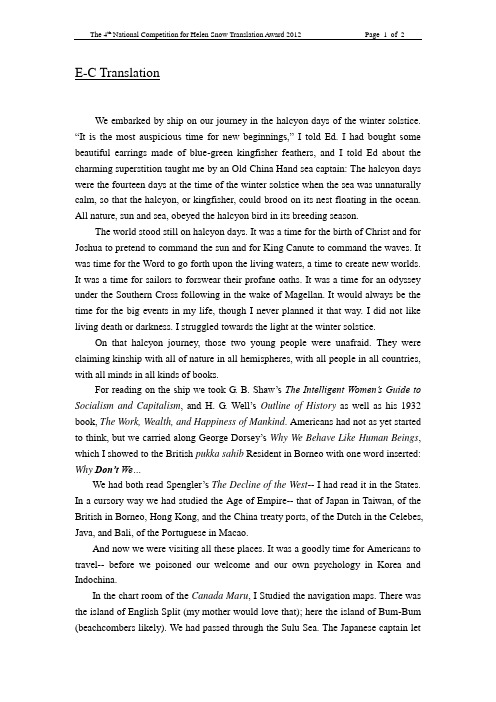
E-C TranslationWe embarked by ship on our journey in the halcyon days of the winter solstice. “It is the most auspicious time for new beginnings,” I told Ed. I had bought some beautiful earrings made of blue-green kingfisher feathers, and I told Ed about the charming superstition taught me by an Old China Hand sea captain: The halcyon days were the fourteen days at the time of the winter solstice when the sea was unnaturally calm, so that the halcyon, or kingfisher, could brood on its nest floating in the ocean. All nature, sun and sea, obeyed the halcyon bird in its breeding season.The world stood still on halcyon days. It was a time for the birth of Christ and for Joshua to pretend to command the sun and for King Canute to command the waves. It was time for the Word to go forth upon the living waters, a time to create new worlds. It was a time for sailors to forswear their profane oaths. It was a time for an odyssey under the Southern Cross following in the wake of Magellan. It would always be the time for the big events in my life, though I never planned it that way. I did not like living death or darkness. I struggled towards the light at the winter solstice.On that halcyon journey, those two young people were unafraid. They were claiming kinship with all of nature in all hemispheres, with all people in all countries, with all minds in all kinds of books.For reading on the ship we took G. B. Shaw‟s The Intelligent Women’s Guide to Socialism and Capitalism, and H. G. Well‟s Outline of History as well as his 1932 book, The Work, Wealth, and Happiness of Mankind. Americans had not as yet started to think, but we carried along George Dorsey‟s Why We Behave Like Human Beings, which I showed to the British pukka sahib Resident in Borneo with one word inserted: Why Don’t We…We had both read Spen gler‟s The Decline of the West-- I had read it in the States. In a cursory way we had studied the Age of Empire-- that of Japan in Taiwan, of the British in Borneo, Hong Kong, and the China treaty ports, of the Dutch in the Celebes, Java, and Bali, of the Portuguese in Macao.And now we were visiting all these places. It was a goodly time for Americans to travel-- before we poisoned our welcome and our own psychology in Korea and Indochina.In the chart room of the Canada Maru, I Studied the navigation maps. There was the island of English Split (my mother would love that); here the island of Bum-Bum (beachcombers likely). We had passed through the Sulu Sea. The Japanese captain letme take the wheel of the Canada Maru in the Celebes Sea. He said he would let me take the wheel again just as we crossed the equator. He liked us because we chose his ship out of all others-- it was the one calling at the most unlikely places. He insisted on giving my husband and me his own cabin and private bath, and on turning over his deck to us. He borrowed our books of poetry in exchange. He treated us as if I were Amaterasu, the Sun Goddess, with Apollo in tow. The only other passengers were two or three Japanese businessmen. The warm blue-green South Seas were as clear and smooth as molten glass. Striped-sailed catamarans looked as still and unreal as painted ships.As we approached Borneo, I appeared on deck in English-tailored white jodhpurs, a white cork helmet, and my very American red-white-and-blue scarf half-mast in wilting heat. Red-painted roofs flashed against a white coral shoreline. Casuarina, mangrove, Nipa palm trees nodded a welcome. This was Borneo-- not only Borneo but Tawau! Ten thousand miles from home!My husband looked at me without approval. He would never forgive me for bringing abroad a big black wardrobe trunk with attire for every possible occasion-- from deck shorts to long evening gowns and gold slippers.“You may think yourself a born explorer,” he observed with professional scorn, “but you are no traveler.”The English voice of an ironwood merchant put him in his place, informing me that I was practically the only white woman who had ever stopped at Tawau, except for Mrs. Martin Johnson. He hoped we were not planning to take any movies: “We had to organize a …wild‟ buffalo hunt for her in the rubber groves… All the buffalo were tame, naturally.”“Did you hear” I swelled with pioneer pride. “Second only to Osa Johnson.” But I suggested that the place must be teeming with white men.“Not exactly. Only two of us-- the British Resident and myself. We haven‟t spoken for years,”the merchant said. “It‟s very Somerset Maugham. He thinks I‟m letting down the white man‟s burden because I make canoe trip with the natives looking for rare hardwoods to sell at a profit.”Borneo was a landmark in my life-- a seamark, anyway. Borneo was all but the last outpost of the British Empire to be given up.(863 words)。
韩素音与海伦斯诺翻译竞赛
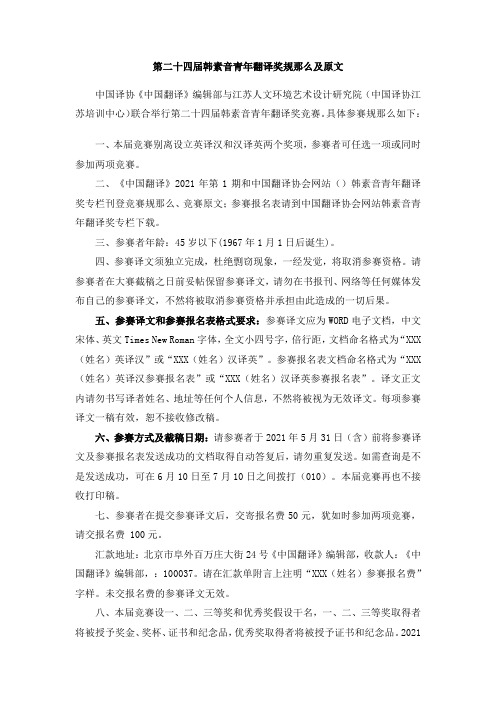
第二十四届韩素音青年翻译奖规那么及原文中国译协《中国翻译》编辑部与江苏人文环境艺术设计研究院(中国译协江苏培训中心)联合举行第二十四届韩素音青年翻译奖竞赛。
具体参赛规那么如下:一、本届竞赛别离设立英译汉和汉译英两个奖项,参赛者可任选一项或同时参加两项竞赛。
二、《中国翻译》2021年第1期和中国翻译协会网站()韩素音青年翻译奖专栏刊登竞赛规那么、竞赛原文;参赛报名表请到中国翻译协会网站韩素音青年翻译奖专栏下载。
三、参赛者年龄:45岁以下(1967年1月1日后诞生)。
四、参赛译文须独立完成,杜绝剽窃现象,一经发觉,将取消参赛资格。
请参赛者在大赛截稿之日前妥帖保留参赛译文,请勿在书报刊、网络等任何媒体发布自己的参赛译文,不然将被取消参赛资格并承担由此造成的一切后果。
五、参赛译文和参赛报名表格式要求:参赛译文应为WORD电子文档,中文宋体、英文Times New Roman字体,全文小四号字,倍行距,文档命名格式为“XXX (姓名)英译汉”或“XXX(姓名)汉译英”。
参赛报名表文档命名格式为“XXX (姓名)英译汉参赛报名表”或“XXX(姓名)汉译英参赛报名表”。
译文正文内请勿书写译者姓名、地址等任何个人信息,不然将被视为无效译文。
每项参赛译文一稿有效,恕不接收修改稿。
六、参赛方式及截稿日期:请参赛者于2021年5月31日(含)前将参赛译文及参赛报名表发送成功的文档取得自动答复后,请勿重复发送。
如需查询是不是发送成功,可在6月10日至7月10日之间拨打(010)。
本届竞赛再也不接收打印稿。
七、参赛者在提交参赛译文后,交寄报名费50元,犹如时参加两项竞赛,请交报名费 100元。
汇款地址:北京市阜外百万庄大街24号《中国翻译》编辑部,收款人:《中国翻译》编辑部,:100037。
请在汇款单附言上注明“XXX(姓名)参赛报名费”字样。
未交报名费的参赛译文无效。
八、本届竞赛设一、二、三等奖和优秀奖假设干名,一、二、三等奖取得者将被授予奖金、奖杯、证书和纪念品,优秀奖取得者将被授予证书和纪念品。
To-Helen-中文翻译-评析
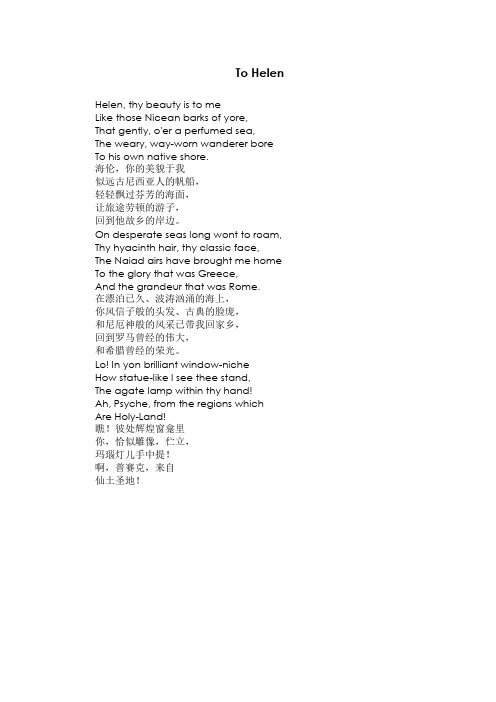
To Helen Helen, thy beauty is to meLike those Nicean barks of yore,That gently, o'er a perfumed sea,The weary, way-worn wanderer bore To his own native shore.海伦,你的美貌于我似远古尼西亚人的帆船,轻轻飘过芬芳的海面,让旅途劳顿的游子,回到他故乡的岸边。
On desperate seas long wont to roam, Thy hyacinth hair, thy classic face,The Naiad airs have brought me home To the glory that was Greece,And the grandeur that was Rome.在漂泊已久、波涛汹涌的海上,你风信子般的头发、古典的脸庞,和尼厄神般的风采已带我回家乡,回到罗马曾经的伟大,和希腊曾经的荣光。
Lo! In yon brilliant window-nicheHow statue-like I see thee stand,The agate lamp within thy hand!Ah, Psyche, from the regions which Are Holy-Land!瞧!彼处辉煌窗龛里你,恰似雕像,伫立,玛瑙灯儿手中提!啊,普赛克,来自仙土圣地!注:1. those Nicean barks of yore: 古代尼西亚人的那些航船,意指具有古典的美。
2. hyacinth: 风信子花。
根据古希腊神话,太阳神阿波罗所钟爱的少年海尔欣瑟斯(Hyacinthus)有一头美丽的长发,在他被误杀后,从他的血泊中长出了一种纤细修长,迎风招展的美丽鲜花。
3. airs: 音乐旋律和曲调。
4. agate: 玛瑙。
5. Psyche: 普塞克,古希腊、罗马神话中嫁给爱神厄洛斯的美女。
海伦斯诺翻译
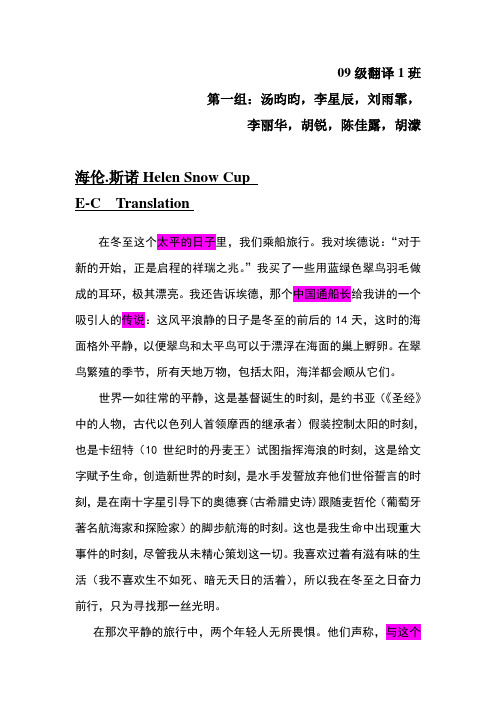
09级翻译1班第一组:汤昀昀,李星辰,刘雨霏,李丽华,胡锐,陈佳露,胡濛海伦.斯诺Helen Snow CupE-C T ranslation在冬至这个太平的日子里,我们乘船旅行。
我对埃德说:“对于新的开始,正是启程的祥瑞之兆。
”我买了一些用蓝绿色翠鸟羽毛做成的耳环,极其漂亮。
我还告诉埃德,那个中国通船长给我讲的一个吸引人的传说:这风平浪静的日子是冬至的前后的14天,这时的海面格外平静,以便翠鸟和太平鸟可以于漂浮在海面的巢上孵卵。
在翠鸟繁殖的季节,所有天地万物,包括太阳,海洋都会顺从它们。
世界一如往常的平静,这是基督诞生的时刻,是约书亚(《圣经》中的人物,古代以色列人首领摩西的继承者)假装控制太阳的时刻,也是卡纽特(10世纪时的丹麦王)试图指挥海浪的时刻,这是给文字赋予生命,创造新世界的时刻,是水手发誓放弃他们世俗誓言的时刻,是在南十字星引导下的奥德赛(古希腊史诗)跟随麦哲伦(葡萄牙著名航海家和探险家)的脚步航海的时刻。
这也是我生命中出现重大事件的时刻,尽管我从未精心策划这一切。
我喜欢过着有滋有味的生活(我不喜欢生不如死、暗无天日的活着),所以我在冬至之日奋力前行,只为寻找那一丝光明。
在那次平静的旅行中,两个年轻人无所畏惧。
他们声称,与这个世间的所有生物攀亲道故,与各个国家的所有人民称兄道弟,甚至与藏于书中的所有智慧惺惺相惜。
闲暇之余,我们挑选了几本书阅读,有乔治.肖伯纳(英国现代杰出的现实主义剧作家)的《智慧女性之社会主义和资本主义指南》,赫伯特.乔治.威尔斯(英国著名科幻小说家)的《世界史纲》以及他在1932年出版的《人类的工作、财富和幸福》。
虽然美国人还未开始思考,但是我们有一书相伴,就是乔治.多西的《为什么我们表现的像人类》,我给婆罗洲(加里曼丹的旧称)的一等居民看这本书的时候,我加了一个字:我们为什么“不”······我们还阅读了奥斯瓦尔德.斯宾格勒(德国著名文学家,历史哲学家)的《西方的没落》(我曾在美国读过),我们大概得知日本侵略台湾的帝国时代,英国占领婆罗洲,香港,和中国通商口岸的帝国时代,荷兰控制西里伯斯岛(印尼苏拉威西岛旧称),爪哇岛(位于印尼),巴厘岛(位于印尼)的帝国时代,葡萄牙殖民中国澳门的帝国时代。
海底两万里 好句摘抄30句 【双语版】
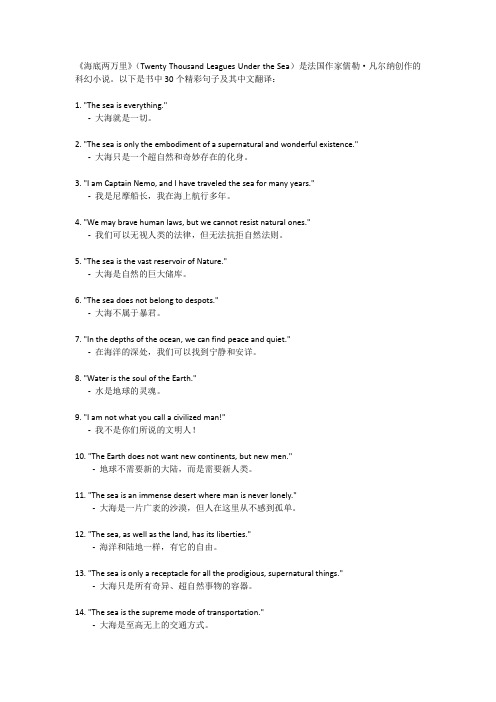
《海底两万里》(Twenty Thousand Leagues Under the Sea)是法国作家儒勒·凡尔纳创作的科幻小说。
以下是书中30个精彩句子及其中文翻译:1. "The sea is everything."-大海就是一切。
2. "The sea is only the embodiment of a supernatural and wonderful existence."-大海只是一个超自然和奇妙存在的化身。
3. "I am Captain Nemo, and I have traveled the sea for many years."-我是尼摩船长,我在海上航行多年。
4. "We may brave human laws, but we cannot resist natural ones."-我们可以无视人类的法律,但无法抗拒自然法则。
5. "The sea is the vast reservoir of Nature."-大海是自然的巨大储库。
6. "The sea does not belong to despots."-大海不属于暴君。
7. "In the depths of the ocean, we can find peace and quiet."-在海洋的深处,我们可以找到宁静和安详。
8. "Water is the soul of the Earth."-水是地球的灵魂。
9. "I am not what you call a civilized man!"-我不是你们所说的文明人!10. "The Earth does not want new continents, but new men."-地球不需要新的大陆,而是需要新人类。
海伦斯诺翻译译文 英译汉
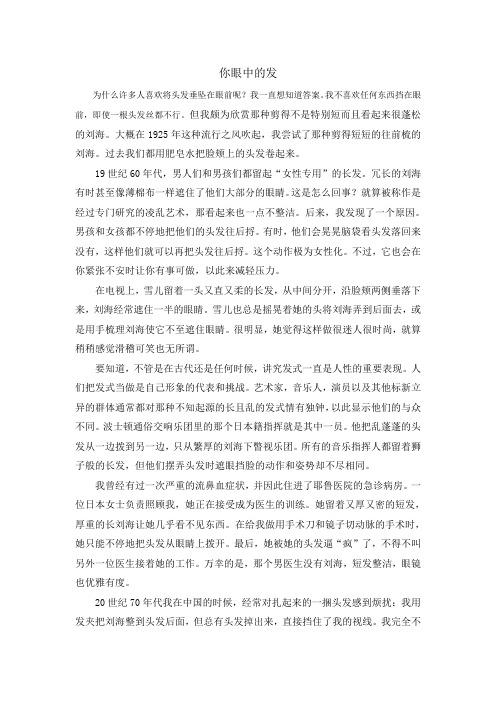
你眼中的发为什么许多人喜欢将头发垂坠在眼前呢?我一直想知道答案。
我不喜欢任何东西挡在眼前,即使一根头发丝都不行。
但我颇为欣赏那种剪得不是特别短而且看起来很蓬松的刘海。
大概在1925年这种流行之风吹起,我尝试了那种剪得短短的往前梳的刘海。
过去我们都用肥皂水把脸颊上的头发卷起来。
19世纪60年代,男人们和男孩们都留起“女性专用”的长发。
冗长的刘海有时甚至像薄棉布一样遮住了他们大部分的眼睛。
这是怎么回事?就算被称作是经过专门研究的凌乱艺术,那看起来也一点不整洁。
后来,我发现了一个原因。
男孩和女孩都不停地把他们的头发往后捋。
有时,他们会晃晃脑袋看头发落回来没有,这样他们就可以再把头发往后捋。
这个动作极为女性化。
不过,它也会在你紧张不安时让你有事可做,以此来减轻压力。
在电视上,雪儿留着一头又直又柔的长发,从中间分开,沿脸颊两侧垂落下来,刘海经常遮住一半的眼睛。
雪儿也总是摇晃着她的头将刘海弄到后面去,或是用手梳理刘海使它不至遮住眼睛。
很明显,她觉得这样做很迷人很时尚,就算稍稍感觉滑稽可笑也无所谓。
要知道,不管是在古代还是任何时候,讲究发式一直是人性的重要表现。
人们把发式当做是自己形象的代表和挑战。
艺术家,音乐人,演员以及其他标新立异的群体通常都对那种不知起源的长且乱的发式情有独钟,以此显示他们的与众不同。
波士顿通俗交响乐团里的那个日本籍指挥就是其中一员。
他把乱蓬蓬的头发从一边拨到另一边,只从繁厚的刘海下瞥视乐团。
所有的音乐指挥人都留着狮子般的长发,但他们摆弄头发时遮眼挡脸的动作和姿势却不尽相同。
我曾经有过一次严重的流鼻血症状,并因此住进了耶鲁医院的急诊病房。
一位日本女士负责照顾我,她正在接受成为医生的训练。
她留着又厚又密的短发,厚重的长刘海让她几乎看不见东西。
在给我做用手术刀和镜子切动脉的手术时,她只能不停地把头发从眼睛上拨开。
最后,她被她的头发逼“疯”了,不得不叫另外一位医生接着她的工作。
万幸的是,那个男医生没有刘海,短发整洁,眼镜也优雅有度。
海伦斯诺翻译大赛2014英译汉参考译文
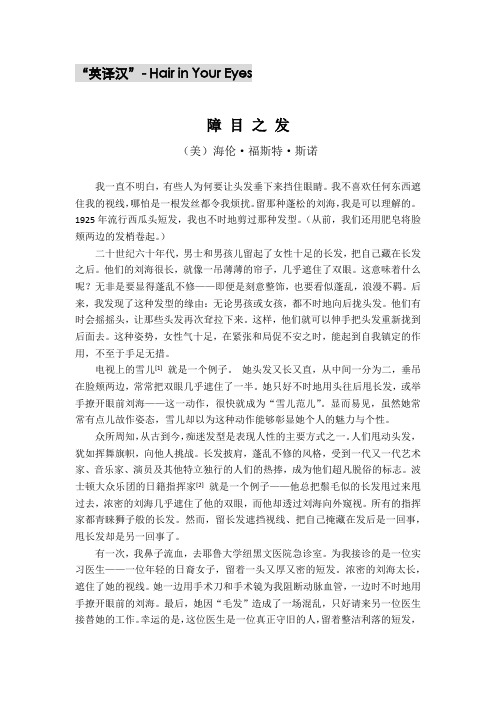
“英译汉”- Hair in Your Eyes障目之发(美)海伦·福斯特·斯诺我一直不明白,有些人为何要让头发垂下来挡住眼睛。
我不喜欢任何东西遮住我的视线,哪怕是一根发丝都令我烦扰。
留那种蓬松的刘海,我是可以理解的。
1925年流行西瓜头短发,我也不时地剪过那种发型。
(从前,我们还用肥皂将脸颊两边的发梢卷起。
)二十世纪六十年代,男士和男孩儿留起了女性十足的长发,把自己藏在长发之后。
他们的刘海很长,就像一吊薄薄的帘子,几乎遮住了双眼。
这意味着什么呢?无非是要显得蓬乱不修——即便是刻意整饰,也要看似蓬乱,浪漫不羁。
后来,我发现了这种发型的缘由:无论男孩或女孩,都不时地向后拢头发。
他们有时会摇摇头,让那些头发再次耷拉下来。
这样,他们就可以伸手把头发重新拢到后面去。
这种姿势,女性气十足,在紧张和局促不安之时,能起到自我镇定的作用,不至于手足无措。
电视上的雪儿[1]就是一个例子。
她头发又长又直,从中间一分为二,垂吊在脸颊两边,常常把双眼几乎遮住了一半。
她只好不时地用头往后甩长发,或举手撩开眼前刘海——这一动作,很快就成为“雪儿范儿”。
显而易见,虽然她常常有点儿故作姿态,雪儿却以为这种动作能够彰显她个人的魅力与个性。
众所周知,从古到今,痴迷发型是表现人性的主要方式之一。
人们甩动头发,犹如挥舞旗帜,向他人挑战。
长发披肩,蓬乱不修的风格,受到一代又一代艺术家、音乐家、演员及其他特立独行的人们的热捧,成为他们超凡脱俗的标志。
波士顿大众乐团的日籍指挥家[2]就是一个例子——他总把鬃毛似的长发甩过来甩过去,浓密的刘海几乎遮住了他的双眼,而他却透过刘海向外窥视。
所有的指挥家都青睐狮子般的长发。
然而,留长发遮挡视线、把自己掩藏在发后是一回事,甩长发却是另一回事了。
有一次,我鼻子流血,去耶鲁大学纽黑文医院急诊室。
为我接诊的是一位实习医生——一位年轻的日裔女子,留着一头又厚又密的短发。
浓密的刘海太长,遮住了她的视线。
- 1、下载文档前请自行甄别文档内容的完整性,平台不提供额外的编辑、内容补充、找答案等附加服务。
- 2、"仅部分预览"的文档,不可在线预览部分如存在完整性等问题,可反馈申请退款(可完整预览的文档不适用该条件!)。
- 3、如文档侵犯您的权益,请联系客服反馈,我们会尽快为您处理(人工客服工作时间:9:00-18:30)。
The Impact of Mother to Helen
Each individual is extremely grateful to mother’s tending and educating. The influence of mother is anywhere but subtle. Sometimes we are unaware of the influence on our attitudes and behaviors.
Helen Foster Snow was deeply influenced by her mother, without whom it could be extremely difficult to understand Helen with her attitude towards various challenges and her great motivation and desire for making success. In her struggle for kindness, Helen had had experiences such as being brave to be the first, acting as heroic and fearless and daring to take risks. All above came from her mother’s influence when Helen was young. Hannah Davis Foster, mother of Helen, devoted all her life to public service and her affairs. To improve lives of women and children, Hannah forged ahead and worked very hard. She was once a teacher, a businesswoman and even led community work. Energetic and creative, Hannah always participated in service activities in community with Helen around her, working selflessly for the development of society.
Although she was a women leader, Helen’s mother always did men’s work. For example, she build house herself. Before Helen was 15, she stayed with her mother and learned from her mother during the whole process of her growth and development. In the period that Helen was to be an adult, she absorbed her mother’s crave for accomplishing gracious undertakings and the awareness of serving for the others. Helen’s mother worked very hard all her life and always worked over times. She built parks and playgrounds for children. Also she established the system of tutorship and she hoped that children could grow healthily, becoming physically- strong, noble-thinking, good-attitude and normative-behavior.
As Helen’s mother put it, it was of great importance to adhere to good values and take pleasure in helping others, which she instructed Helen in a methodical and patient way. Helen emphasized on good morals which was a proof that her mother indeed influenced her. If we compared Ha nnah’s life with Helen’s experience, we will find many similarities.
In 4th July, 1910, seated in the float for woman suffrage, Hannah took part in the
Independence Day March on behalf of Utah, for that was one of the first four states to get woman suffrage; Helen was one of the earliest female journalists overseas.
Hannah struggled for the rights for women and children, which Helen worked for women and children in China. Hannah served as the chairwoman of Relief which aimed at seeking women’s development. Moreover, she was the chairwoman of children organization combined with church, who focused on children’ education on morality and service of community. Helen was an advocate to set up industrial cooperative community. She served the Anti-Japanese War of Chinese, helped young woman activists and artists and wrote articles about women’s then situation. Both of them were well achieved in writing and had strong interest in their family history. Both of them did not give up giving enthusiastic service to and cared about others until they said goodbye to the world.
Hannah Davis Foster was gifted in many ways, such as writing and photographing. With her great achievements, Hannah taught Helen many things such as how to take professional photos, write and fish. It was when Helen went to China with her mother’s camera that she took a lot of famous pictures. When Helen learned to write, Hannah exchanged her experience as an old hand with Helen, from which she told her daughter how to acquire some important writing skills.
Living in a traditional, conservative society, Helen’s mother had never made full use of her intelligence and wisdom. Helen regarded herself as a modern women, that was why she never mentioned her mother in public. However, before her death, her exact appreciation of her mother may be her continuous call for her mother. During the last two weeks of Helen’s life, her caregiver Nancy Farnan reported that Helen often called her mother and talked with her, like her mother was in the ward with her.
Hannah i nfluenced Helen’s whole life deeply. The early behaviors and attitudes made Helen very famous in China.。
